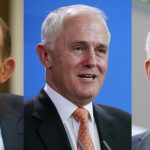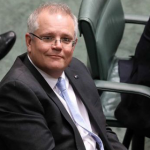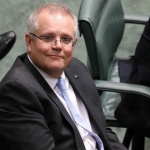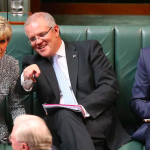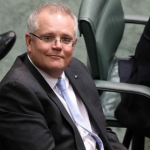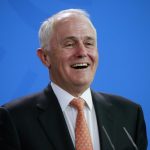Don’t Believe Their Hype: The Coalition Has Blown Out the Economy
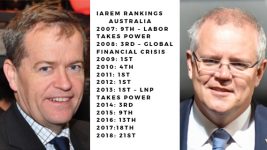
On 11 April, day one of the 2019 election campaign, a delusional Scott Morrison announced to the Australian public that a key reason it should consider re-electing the Coalition into government on 18 May is its economic management credentials.
Indeed, as he held a lump of coal in one hand, and raised the other towards the heavens, the unelected prime minister declared that it had taken the Coalition six years – under Abbott, Turnbull and now him – to turn around Labor’s financial mismanagement and bring about a budget surplus.
And as a couple of switched on members of the audience up the back coughed “bullshit” under their breaths, the rest of the crowd turned to one another somewhat confused, as the thought collectively dawned upon them all, “Hang on, there hasn’t been a budget surplus.”
The Pentecostal PM decided to end his diatribe with a bit of panache and suggested that rather than elect the Labor Party into office, voters should stick to his lot, as they begin to build upon this foundational lie that he was presenting.
As it’s plain to see to anyone who takes a look, the Coalition government has actually thrashed the Australian economy over its time in office, just like a bunch of teenagers who’ve gotten hold of one of their father’s cars for the first time.
According to the Independent
Writing in Independent Australia, journalist Alan Austin has been consistently documenting the fact that the federal Liberal Nationals government has sent the national debt through the roof, straight after federal Labor triumphantly steered the economy through the choppy waters of the GFC.
Going off the Independent Australia Ranking on Economic Management (IAREM), when the Rudd government took over from Howard in December 2007, the Australian economy was ranked 9th in the world. But, the following year, as the GFC was kicking in, Australia had moved up to global 3rd.
Now, as Austin tells it, it was around this time that economists expected the economy to contract, but for the first time, in the 2009 March quarter, Australia’s gross domestic product (GDP) grew at a faster rate than anywhere else in the developing world, bringing it to the rank of number one.
The IAREM index – “which ranks all world economies on the eight key outcomes most citizens require of economic management” – places the Australian economy 4th in 2010, and then for the following three years, it’s back up at the number one position.
The “debt and deficit crisis”
Austin further explains that – just like other nations around the globe – the Australian government borrowed heavily at the time of the GFC in order to stimulate the economy and generate the best outcome, which Labor successfully did at the time.
In 2011, as the national debt grew because of this, the Coalition and Newscorp started harping on about the “Labor debt and deficit disaster”. And this idea became Abbott’s favourite whipping boy as he successfully led the Liberal Nationals into power during the 2013 election.
But, as Austin made clear in a 15 March article, after six years of Coalition management, the gross national debt has exceeded $545 billion dollars, which is more than double the accumulated debt of all the successive governments from 1854, right up until when it took over in September 2013.
The real debt crisis
As Sydney Criminal Lawyers reported back in February this year, at the time of the 2013 election, Tony Abbott was decrying the national debt under the Rudd government, which was sitting at $237 billion.
The incoming PM promised he’d be reducing government spending, lowering deficits and he’d start paying off the debt. However, within two years, he’d added another $100 billion to it, while in June 2017, then treasurer Scott Morrison oversaw the debt as it passed the half a trillion dollar mark.
And if the Australian Debt Clock is anything to go by, the national debt is about to reach $700 billion. However, many economists state that focusing on the gross national debt – and all that government spending – is wrong. And it’s net debt – the gross minus money owed – that’s important.
At the time the Coalition took power in September 2013, the net debt was around $174.5 billion. However, as of July last year, this had more than doubled, sitting at over $374 billion. While, in March, the net debt was creeping up to $377 billion.
Key figures skyrocket
Although, UNSW Economics Professor Richard Holden said via email in February that the best way to gauge the increase in government debt is net debt as a percentage of GDP, as ”thinking of it relative to GDP is important because the size of the economy dictates our ability to service the debt”.
Under Gillard, the net debt was just 6.4 percent of GDP in the year 2010-11. And in Labor’s final full year in power, 2012-13, the net debt was 10.4 percent of gross domestic product. While at the end of the first financial year under the Coalition, net debt to GDP had risen to 13.1 percent.
Over the last financial year, this figure had jumped to 18.5 percent. And the latest government figures estimate net debt will rise to 19.2 percent of GDP by the end of June. So, since June 2014, the percentage of GDP that the net debt is will have risen by over 46 percent by mid-year.
The choice is yours
So, no matter which way you calculate it, the national debt has soared under six years of Coalition economic mismanagement. And the public has to ask itself whether it wants to elect Morrison – who ran the debt through the roof whilst in charge of the treasury – as the next PM.
Because it does sound similar to entrusting your middle-aged uncle with the family debit card, whilst he’s in the pokie room down at the local bar late on a Sunday night, after he’s had one too many drinks whilst watching the defeat of his favourite football team – the Sharks – on the pub TV.


